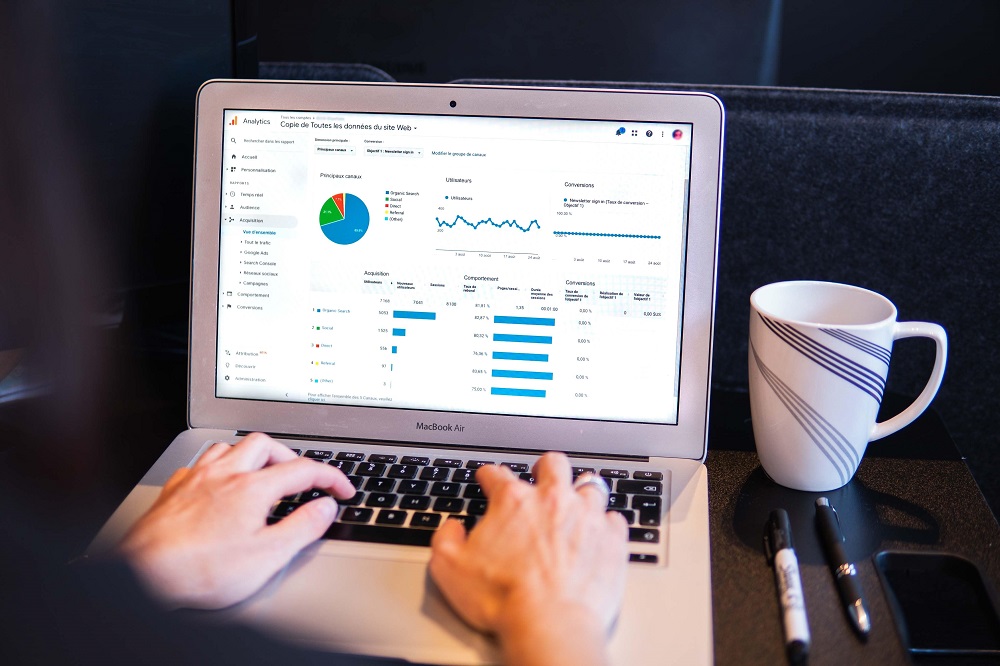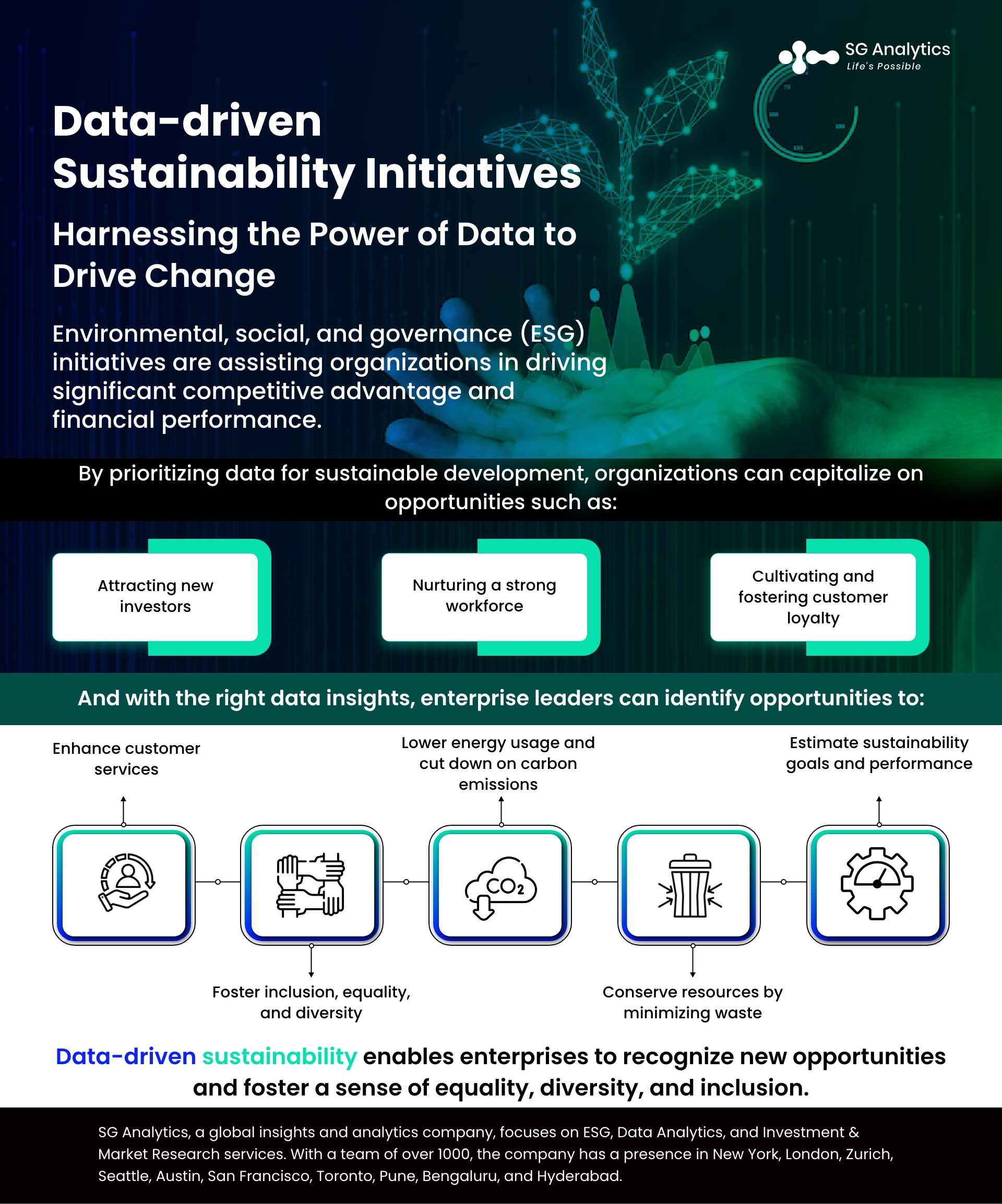With climate action emerging as an urgent global priority, the pursuit of sustainability and ESG initiatives has become imperative for organizations across the globe. ESG initiatives are aimed at meeting sustainability goals as well as driving significant competitive advantage, along with innovation and financial performance. Organizations are undertaking a holistic and collaborative process to determine their sustainability goals and leverage the framework to achieve them.
Data, along with analytics, is becoming integral to every stage of this transformation cycle. And the key to success lies in meeting the set sustainability goals with the effective deployment of technology and management. Data is enabling enterprises to bring together past patterns and generate predictive insights to guide their ESG initiatives further. It enables leaders to render financial, social, and environmental change and lay the foundation for a sustainable future. Leaders are shifting to data-driven insights to create resilient and purpose-led organizations with an aim to prioritize communities, employees, and the environment.
Read more: Data as a Strategic Asset: How are Businesses Embracing the Mindset
The Sustainability Imperative
Data analytics is enabling organizations to overcome the challenges faced in scaling green initiatives and achieving sustainability goals. They are harnessing the power of data to break down silos and integrate sustainability into core business operations, thereby fostering a supportive organizational culture and building the necessary skills to drive data-driven sustainability.

But to further scale green initiatives and achieve sustainability goals can be a challenging task.
By leveraging data and sustainability analytics, organizations can gain valuable insights into their environmental impact and use sustainability data insights to identify areas for improvement and to drive change.
Governments globally are also doubling down on their commitments to tackle environmental challenges by introducing budgetary and operational pressure on industries to respond to climate change. This is directly affecting societies and global economies.
For organizations embracing sustainable business practices is no longer an option. Customers, employees, and investors expect organizations to focus on long-term value creation that supports environmental and social sustainability. Leaders are turning to data-driven solutions to create resilient, purpose-led sustainable frameworks with a mission to prioritize communities and the environment. By prioritizing data for sustainable development, organizations can capitalize on opportunities such as:
-
Attracting New Investors
Research has highlighted that organizations with ESG practices tend to produce higher returns and lowers price declines. Many investors are also paying attention to organizations that implement ESG frameworks in their operations. Beyond the bottom line, research has also showcased that sustainable business practices have numerous positive outcomes, like improving risk management compliance, driving competitive advantage, and fostering technological innovation.
-
Cultivating and Fostering Customer Loyalty
With every generation, consumers become more and more conscious about their purchases and their impact on the environment around them. A recent study highlighted that consumers rank sustainability as a critical component. Today many consumers are willing to change their shopping habits to lower the impact on the environment. Many are choosing sustainable or eco-friendly brands.

Read more: Building Data Trust for Data-Driven Decision-Making Across Organizations
-
Nurturing a Strong Workforce
Sustainability initiatives are also critical in recruiting and retaining diverse talent across the organization. With new generations entering the workforce, it is vital for organizations to be socially conscious while evolving with and adapting to change. Organizations that act on social and environmental issues and have sustainable practices at the core are more likely to be considered by employees when deciding where to work.
Data-driven sustainability enables enterprises to collect and use data for data-driven strategies that guide measurable and responsible practices. Whether lowering greenhouse-gas emissions or optimizing supply chains and reducing waste, data-driven sustainability insights help power positive change while increasing profitability.
Organizations are further standardizing and centralizing their data and processes, enabling data providers to locate and analyze the collected records more quickly. They are also embedding robotic process automation in tasks for employees to refocus on higher-value work. With the right data insights, enterprise leaders can identify opportunities to:
-
Enhance customer services
-
Foster inclusion, equality, and diversity
-
Lower energy usage and cut down on carbon emissions
-
Conserve resources by minimizing waste
-
Estimate sustainability goals and performance

For enterprises today, every data point assists in making the right choices. It is vital in a process that supports organizational objectives as well as financial and legal decisions. Marketers are also taking the right steps to set their brands up for success. By incorporating these data-driven marketing strategies, they are improving their efficiency and enabling the brand to emerge stronger than ever.
Read more: Data Analytics is Unlocking New Possibilities in the EdTech Industry. How?
Taking the Right Step Toward a Sustainable Tomorrow
For enterprises, data-driven sustainability implies collecting and integrating data to make decisions and guide responsible business practices. By leveraging data analytics, organizations can gain valuable insights into their environmental impact and identify areas for advancement and take data-driven actions to reach their sustainability objectives.
Using data for action and social impact involves three critical steps:
-
Defining industry-specific purposes: It is critical for organizations to take an industry-led approach by laying out sustainability objectives that are right for the operations and industry to achieve significant outcomes.
-
Building a sustainable framework: When identifying sustainability goals, it is critical for organizations to use data to guide their action plan. By integrating machine learning (ML) and AI, organizations can rely on data modeling techniques to analyze their existing processes and achieve their sustainability goals, like reducing energy consumption.
-
Combining human and machine intelligence: By integrating the latest technology to drive sustainability goals coupled with human expertise, organizations can incorporate augmented intelligence into their operations to cover many data processing tasks and make confident data-driven decisions.

These steps will enable a purpose-led organization to support its communities, foster a sense of diversity and inclusion, and integrate more ethical business practices. By prioritizing data-driven sustainability initiatives, organizations can stay ahead of the changing regulatory standards while also capitalizing on opportunities for growth. ESG best practices also enable organizations to recruit and retain diverse talent.
Read more: Big Data Analytics and its Significance for Top Edtech Organizations
Integrating a Sustainable Framework for Future
Environmental, social, and governance (ESG) initiatives are assisting organizations in driving significant competitive advantage and financial performance. With automated data collection, enterprises are making real-time strategic decisions to achieve sustainability goals. In addition, they are also prioritizing data for sustainable development for organizations to stay abreast with the regulatory standards.
For organizations, embracing data-driven sustainability involve three key stages -
-
defining the industry-specific goals to take an industry-led approach to achieving significant results.
-
building a framework with technologies such as machine learning and AI, enabling leaders to rely on data modeling and forecasting techniques to connect with sustainability plans
-
combining human and machine intelligence to drive sustainability goals. While human expertise is critical, with data, they can power augmented intelligence.

Artificial intelligence and data analytics are taking over many data processing tasks, enabling organizations to unlock critical insights and make confident data-driven decisions. With data-driven sustainability, enterprises can recognize new opportunities as well as improve customer services and foster a sense of equality, diversity, and inclusion, along with reducing energy usage and carbon emissions.
By following these actions, purpose-led organizations can support their communities and become more inclusive, thus building more ethical business practices. And with technology and analytics, enterprises can foster a positive change in their broader ecosystems while gaining a competitive edge.
With a presence in New York, San Francisco, Austin, Seattle, Toronto, London, Zurich, Pune, Bengaluru, and Hyderabad, SG Analytics, a pioneer in Research and Analytics, offers tailor-made services to enterprises worldwide.
A leading enterprise in Data Analytics, SG Analytics focuses on leveraging data management, analytics, and data science to help businesses in edtech and other industries discover new insights and craft tailored growth strategies. Contact us today to make critical data-driven decisions, prompting accelerated business expansion and breakthrough performance.

About SG Analytics
SG Analytics is an industry-leading global insights and analytics firm providing data-centric research and contextual analytics services to its clients, including Fortune 500 companies, across BFSI, Technology, Media & Entertainment, and Healthcare sectors. Established in 2007, SG Analytics is a Great Place to Work® (GPTW) certified company and has a team of over 1100 employees and has presence across the U.S.A, the U.K., Switzerland, Canada, and India.
Apart from being recognized by reputed firms such as Analytics India Magazine, Everest Group, and ISG, SG Analytics has been recently awarded as the top ESG consultancy of the year 2022 and Idea Awards 2023 by Entrepreneur India in the “Best Use of Data” category.









